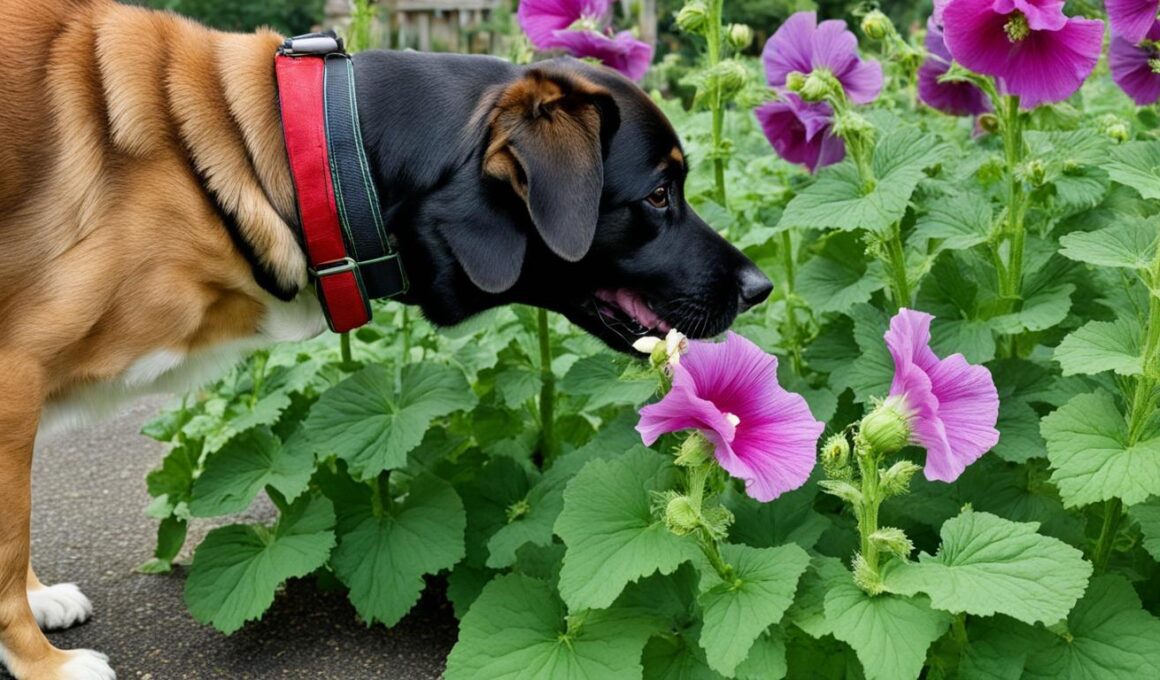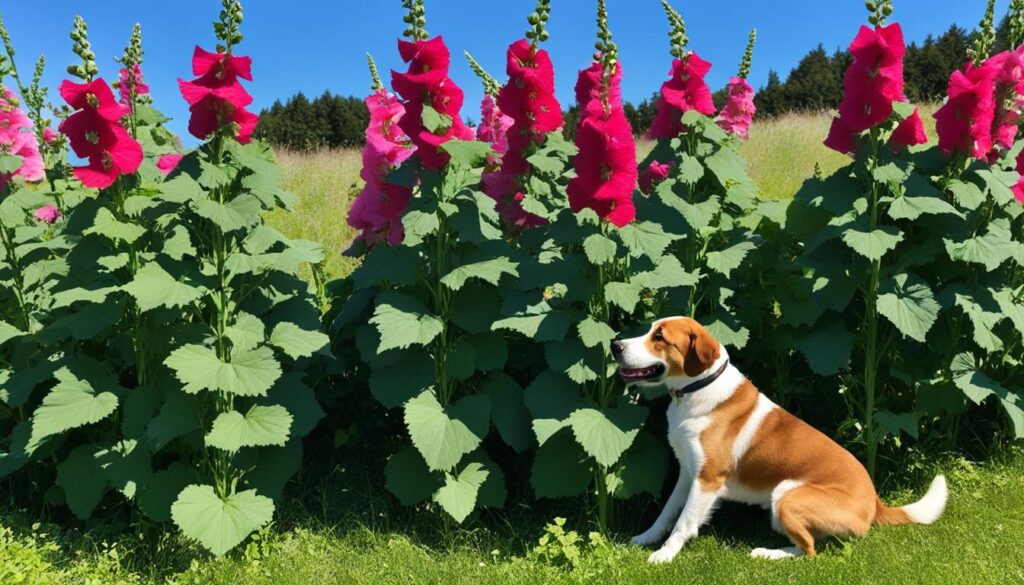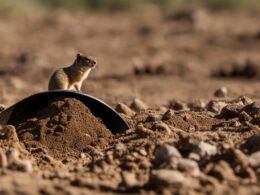Welcome to our guide on hollyhocks and their potential toxicity to dogs. As a dog owner, it’s important to be aware of the plants that could pose a risk to your canine companion. In this section, we will explore whether hollyhocks are poisonous to dogs and how to ensure your pet’s safety when it comes to plant toxicity.
Many dog owners wonder about the safety of hollyhocks as they add beauty to gardens with their tall flowering stalks. The good news is that hollyhocks are generally non-poisonous to dogs. However, caution should still be exercised due to the possibility of skin irritation from the plant’s stems and leaves.
While hollyhocks themselves are not toxic if ingested, a dog that jumps into the plant or brushes against it may experience skin irritation. The stems and leaves of hollyhocks can contain resin or fiber that may cause allergies or irritation in some dogs. It’s important to note that these cases are rare, but it’s always better to be safe than sorry.
To protect your furry friend, make sure to monitor their interactions with hollyhocks. If you notice any signs of skin irritation, such as redness, itching, or rashes, it’s advisable to consult a veterinarian for appropriate treatment. Additionally, remember to wash your hands after handling hollyhocks to prevent any potential skin irritation.
In the next sections, we will explore other pet-friendly flowers that you can consider planting in your garden, ensuring both beauty and safety for your furry companion. Stay tuned!
Hollyhocks and Pet Safety
Hollyhocks are generally safe for dogs, but it is important to exercise caution due to the possible presence of skin irritants in the stems and leaves. Although the flowers themselves are non-poisonous, dogs may experience allergies or irritation if they come into direct contact with the resin or fiber in the plant.
Symptoms of skin irritation can include redness, itching, and rashes. If your dog has been in close contact with hollyhocks, it is recommended to monitor them closely for any signs of irritation. Additionally, remember to wash your hands after handling the plant resin to prevent any potential reactions.
Please note that the level of toxicity may vary among individual dogs, and some dogs may be more sensitive to certain plants than others. If you notice any signs of skin irritation or if you have any concerns, it is advisable to consult a veterinarian for appropriate treatment.
To help you visualize the hollyhock plant, here is an image:
Additional Tips for Pet Safety:
– Avoid allowing your dog to chew or eat any parts of the hollyhock plant.
– Consider planting hollyhocks in areas that are inaccessible to your dog.
– If you have a particularly curious or prone-to-chewing dog, it may be best to avoid planting hollyhocks altogether.
Other Pet-Friendly Flowers
In addition to hollyhocks, there are several other pet-friendly flowers that you can consider planting in your garden. Some of these include roses, African violets, orchids, bee balm, lilies, aster, zinnia, sunflower, and pansies. These flowers are generally safe for dogs and do not pose a risk of poisoning.
Remember, it is always recommended to check with a veterinarian or research specific flower varieties to ensure their safety for pets. By choosing these non-toxic flowers, you can create a beautiful and pet-safe garden for you and your furry friend to enjoy.
Other Pet-Friendly Flowers
In addition to hollyhocks, there are several other pet-friendly flowers that you can consider planting in your garden. Some of these include roses, African violets, orchids, bee balm, lilies (certain varieties), aster, zinnia, sunflower, and pansies. These flowers are generally safe for dogs and do not pose a risk of poisoning. However, it is always recommended to check with a veterinarian or research specific flower varieties to ensure their safety for pets.
The mentioned flowers come in various colors, sizes, and types, providing a range of options for you to create a beautiful and pet-safe garden. By choosing these non-toxic flowers, you can enjoy the beauty of your garden while providing a safe environment for your canine companions.
Conclusion
In conclusion, hollyhocks are generally non-poisonous to dogs. However, it is important to exercise caution due to the potential for skin irritation from the plant’s stems and leaves. While hollyhocks themselves are unlikely to cause harm, dogs can develop allergies or experience discomfort if they come into direct contact with the resin or fiber present in the plant.
If you are a dog owner looking to decorate your garden without compromising your pet’s safety, there are several pet-friendly flower options available. Roses, African violets, orchids, bee balm, lilies (certain varieties), aster, zinnia, sunflower, and pansies are all safe alternatives that provide both beauty and peace of mind.
It is important to be aware of any symptoms of plant poisoning in dogs and to promptly seek veterinary attention if any signs of illness occur. Loss of appetite, dehydration, vomiting, bleeding gums, agitation, or nosebleeds could indicate that your dog has ingested or come into contact with a toxic plant. By choosing pet-friendly flowers and taking necessary precautions, such as using pet repellent sprays and designating toxic plant-free areas, you can create a beautiful and safe environment for your furry friends.
Are Hollyhocks Harmful to Other Plants Like Creeping Jenny?
Yes, hollyhocks can be harmful to other plants like creeping Jenny and other plants. They are known to compete for nutrients, space, and sunlight, which can inhibit the growth of neighboring plants. It’s best to plant hollyhocks away from smaller, more delicate plants to avoid any potential harm.










